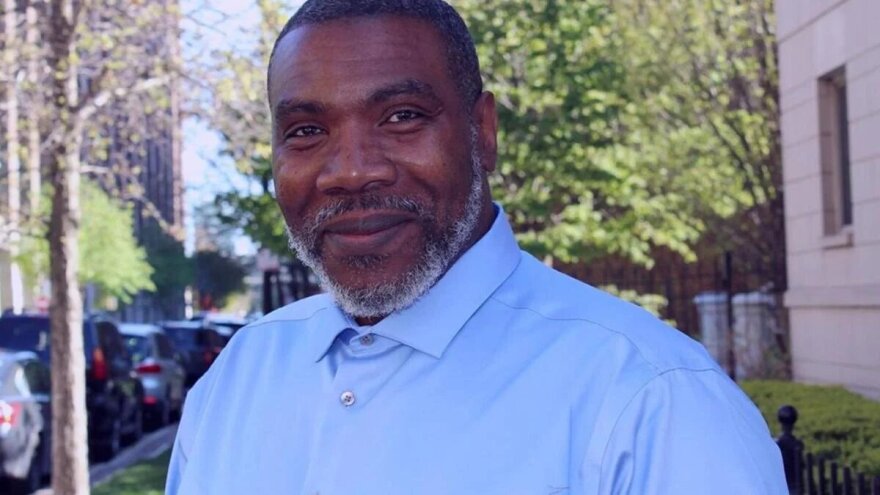A man who spent 37 years behind Illinois prison bars will tell his story to Heartland Community College students and members of the public on Thursday morning.
Renaldo Hudson was originally sentenced to death following the 1983 murder of a Chicago man while Hudson was a teenager; then-Gov. George Ryan in 2003 commuted the sentences of those sentenced to death when he abolished the state's death penalty two days before leaving office, meaning Hudson and 167 others were sentenced to life in prison without the chance of parole.
After decades of self-improvement — Hudson entered prison illiterate and left with a degree in Christian Studies and a spattering of initiatives he started — Gov. JB Pritzker granted him clemency in 2020.
Now the director of education for the Illinois Prison Project, Hudson said his goal now, as an educator, is to tell his story to as many people as possible — hence his appearance in Normal set for Thursday morning. To be clear, Hudson's story is not one of innocence; he has admitted to his role in the brutal stabbing since the beginning. Instead, he said, he hopes to spark empathy for other incarcerated people.
Ahead of his appearance Thursday, Hudson spoke with WGLT; the following is an edited transcript of that interview.
Hudson: I'm definitely the person responsible for my actions. In fact, to my lawyers almost losing their hair and minds, I throughout my process of incarceration would raise the flag of guilt. The reason I did that is because at the core of who Renaldo is, I'm a really good person. I became a victim, who was victimized by the circumstances I was existing in. I did not create those spaces, but I was forced to dwell in them. I was forced to dwell in spaces with a family that was broken, that was scared, that were alcoholics and molesters — all these things were real things. The byproduct of dwelling in those dark, nasty, filthy, places was the act of murder, robbery that led to a person's death.
But that's just one part of my story. That's not my whole story. When we talk about the dangerous, one-sided narrative (about people in prison), we're talking about a need to tell the whole story. I always remind people that society failed little Renaldo and grown Renaldo chooses to love society and say, 'I'm going to reeducate you about the potential of the human spirit.' That's what keeps me excited and doesn't allow me to be depressed, to fall victim to hopelessness. I hope to be, for the rest of my life, a beacon of hope.
WGLT: If you didn't always have that perspective, there had to be a low point where you were not seeing it like this — and then you did. How did you get to that point?
Hudson: On death row, they used to allow us to have what we would call death row parties. If it's one guy's birthday, like 10 of us could (go) to a space and they would lock it up and let us have in there cake and music and kind of celebrate each other.
I went to the yard one day and none of my friends were on the yard. After the yard, they gave us showers, and when I went to the shower, one of my other friends was in the shower next door to me. I said, 'Where were y'all at?' And he was like, 'Oh. We were at so-and-so's birthday party.' I was like,'"Why didn't y'all tell me?'
He was like, 'Nardo... didn't nobody want you at that party.'
You're telling me I was dis-invited to a death row party? Like how low can you go on this earth, when you are in a room with Freddy Krueger, Michael Myers, ice pick Jones and everybody else is looking at you going, 'Eh...'
That really resonated with me. It was like, 'Oh my God, I am so bad that what are defined as the 'worst of the worst' (don't want me around).'
I laid in bed and I said to myself as I was laying there that I didn't want to die in this condition. I was not thinking about being released — I was thinking about what would I release into the earth for the rest of my life. From that day to this very day, I never committed another offense. That was in 1994 while on death row.
My motivation was that when they called to execute me, I was going to be able to say I stopped being a terrorist. I stopped being a tyrant. I stopped being a tyrant. So, it was in the '90s that I began my journey for self-development.
WGLT: You see yourself as a byproduct of your own work — that the system didn't do that for you or with you.
Hudson: That's a fact. I am not the byproduct of a system that decided to invest in me. In fact, it's the very opposite. When I was originally arrested, I couldn't read or write. And when I requested to be put in school, I was told things like, 'Well, money is not allocated to educate people like you.' I was then told by the deputy director (of IDOC), 'Hudson, what is wrong with you? We're going to execute you. Why would we waste the time to educate you?' So, I do not give credit to the system for my personal development.
There are hundreds, if not thousands, of men and women who have tremendous potential, but they're not being given space by the system that exists the way it exists. When I began to recognize that the power that corrections had over me wasn't that I was locked in a cell, it was that my brain was locked, and I didn't have access to dream. I knew that the more that I could read, the more I would be able to expand my dream, my vision.
I will say that the reason I'm able to read and write and articulate things the way I do now is that an officer in my early years would stop by the cell and ask me why I watched so much television. I was like, 'Because I have a TV and I have nothing else to do.' She asked if I had a GED and I said no. She said, 'You need to turn off your TV until you earn your GED.' And she stopped by every day and inspired me.
It went from being on death row, to life without the possibility of parole, which really expanded things because then I got in school. I got my GED. I got my associate's degree. And then in the Danville Correctional Center, they opened up the first seminary in the history of the DOC and I was one of the first people to join it. I left with a bachelor's of divinity.
WGLT: How do you keep the momentum up to keep telling your story? There's always going to be a hater, right?
Hudson: There have been so many articles written about me since I've been home. I didn't know that it was not wise to read comments. I felt so bad, like such a horrible person. But I don't shy away from what I did. I say you have every right to feel that way, because guess what? I did it and I don't get to control how you feel about it. I'm wearing that scarlet letter regardless of how many people cheer me on. I have to live the rest of my life with who I am and I can never take back anything that I've already done.
But what I can do is lay the track record of what my life has been since then. It shows that no matter who you are, where you're from, you have the potential to be so much better.
WGLT: What's a tangible outcome that you want to see from continually telling your story?
Hudson: I would like to see more people open doors to the conversation about... what real justice looks like. We've been made to believe a dangerous narrative that justice is revenge. That's just not the truth; that is only one component of justice. I want to speak in every county in the United States and talk to people about fair chances. I'm an advocate of fair chances — there's a big difference between fair chances and second chances. What does redemption really look like — and who gets to decide? It is my hope that I could spark empathy, not just sympathy. That's what I want to do for the rest of my life. I think I've got about 45 years left in me, so I've still got time to do some work.



